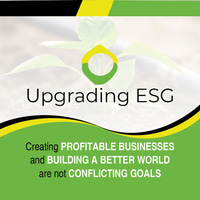Top Ten Sustainable & CSR Trends 2023
Shaping a Sustainable Future: Reflecting on Top Trends and Driving Positive Change in 2024
SUSTAINABILITY


As we delve into the intricate fabric of societal evolution, the paramount themes shaping our world pivot between economics and conflict, echoing through the top sustainable trends of 2023. At this critical juncture, these aspects bear immense weight in our quest for a sustainable and equitable future.
The top two trends of 2023, delineated through the lens of sustainability, encapsulate the dichotomy of economics and war. Both stand as formidable obstacles in the path toward a more harmonious and sustainable world. Within these themes, a palpable struggle surfaces—one where archaic economic paradigms vie against the pursuit of holistic well-being for all.
Economics, predominantly perceived as a battleground dominated by fossil fuel dynamics and the traditional dichotomy between the affluent, the underprivileged, and the average citizen, poses a considerable challenge. Unless we pivot our definition of economic success from mere GDP growth towards fostering sustainable well-being across societal strata, progress might remain elusive.
Here's a reflection of my top 10 sustainable trends of 2023:
1. Ethical Divide: The ongoing debate highlights the ethical struggle between societies striving for sustainable practices and those perpetuating detrimental actions, reflecting the moral dilemma of contemporary civilizations.
2. Economic Disparity: The pronounced gap between affluent and impoverished nations underscores the challenge of climate action, emphasizing the unequal burden of responsibility and impact.
3. Fossil Fuel Conflict: The persistent clash over the utilization and dependency on fossil fuels remains a pivotal issue, amplifying the urgency of transitioning to renewable energy sources.
4. EU and IFRS Reporting: Heightened awareness and amplified reporting by the European Union (EU) and the International Financial Reporting Standards (IFRS) contribute significantly to addressing climate concerns, setting global reporting standards for sustainability.
5. Food System Vulnerability: Increasing apprehensions regarding the resilience of federal food systems and global food security underscore the intersection of climate change and agriculture, necessitating urgent reforms.
6. Combatting Greenwashing: The escalating battle against greenwashing practices and the necessity for transparent product labeling highlights the importance of authenticity and integrity in sustainable initiatives.
7. Financial Hurdles in Developing Nations: Challenges in financing climate change mitigation and sustainable food projects in developing nations underscore the need for global cooperation and inclusive financial strategies.
8. Corporate Social Responsibility Focus: The imperative yet insufficient emphasis on corporate social responsibility (CSR) reveals the pivotal role corporations play in combating climate change and the necessity for more concerted efforts.
9. Carbon Capture Skepticism: Skepticism surrounding carbon capture technologies brings attention to the complexities and uncertainties in this area, prompting a re-evaluation of strategies for mitigating emissions.
10. Government Inertia and Public Apathy: The prevalent government stonewalling and indecisiveness, coupled with a pervasive public apathy toward the climate crisis, reflect the pressing need for decisive action and widespread engagement in addressing this global issue.
I thought this diagram offers an interesting perspective on the Trends.
https://www.greenmatch.co.uk/blog/sustainability-trends
Let’s look at A-Planet’s sustainability and CSR Trends. Interesting that the headline includes CSR i- Corporate Social Responsibility in their wording. Hopefully, this is the start of a new approach to CSR.
https://aplanet.org/resources/sustainability-and-csr-trends/
Key Sustainability Trends for 2024
1. Climate-Positive Technology. ...
2. Boom in Sustainability Jobs. ...
3. Preparation for CSRD. ...
4. Mandatory disclosures on the rise. ...
5. Greenwashing Under Scrutiny. ...
6. Deeper Integration into Companies Financial Statements. ...
7. Scope 3 Emissions and Supply-Chain Transparency. ...
8. Expansion beyond Public Listed Companies.
9. Artificial Intelligence (AI) within Sustainability
Referencing A-Planet's top trends projected for 2024, there's a unique blend of hope and urgency in anticipating the shifts that will define our coming year. The amalgamation of these insights sparks thought-provoking discussions about societal impact and its intricate interplay with businesses.
For those passionate about contributing to a better world, my book Upgrading ESG – How Business Can Thrive in the Age of Sustainability available on Amazon dives deeper into these themes, providing insights and avenues for tangible change.
In my book “Upgrading ESG — How Business Can Thrive in the Age of Sustainability”. I highlight that “Creating profitable businesses and building a better world are not conflicting goals”, and by bringing fresh ideas and innovation, we can do both — create more profit opportunities and make an impact towards a more sustainable world.
In the Book, I highlight that a Good Society holds one of the keys to a better and fairer world. Without a Good Society, we can not make a global change, we will not progress.
The age of sustainability represents a massive opportunity for governments, companies and people -Empowering People. Healing the Planet.
To buy the book or reach out to me:
https://www.upgradingesg.com/book
Feel free to reach out to me by email: Jeffrey@upgradingESG.com
Thank You
Jeffrey Levine




